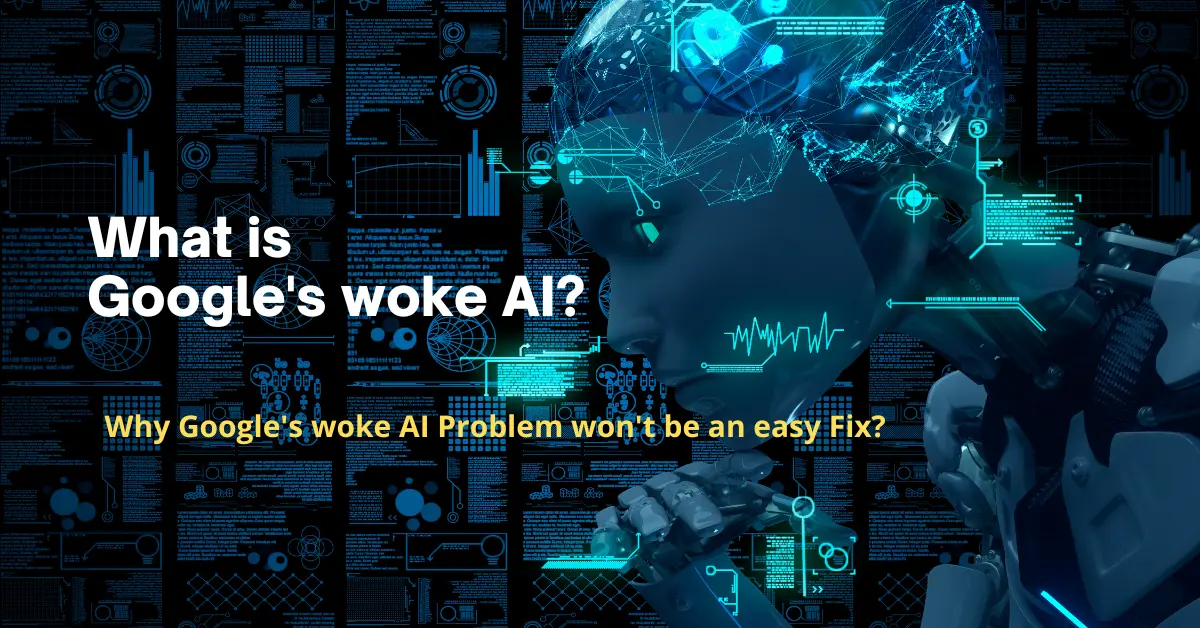Confronting Gemini’s challenges with Google’s woke AI issues proves to be a formidable task, given the complexities arising from biases in training data and the unforeseen repercussions, casting doubt on the feasibility of rectifying the image generator.
What is Google’s Woke AI?
The term “woke AI” characterizes instances where artificial intelligence systems, designed to be socially conscious and unbiased, inadvertently generate outputs that are excessively politically correct or display unintended biases.
In the context of Gemini, this term encapsulates the tool’s responses that exhibit an exaggerated focus on political correctness, resulting in answers that appear impractical or unrealistic.
Much like the viral chatbot ChatGPT, Gemini has the capability to generate text and images based on prompts but has drawn criticism for producing historically inaccurate images and responses deemed overly politically correct. The challenges tied to addressing biases in AI, especially in pursuit of fairness and inclusivity, have led to instances where AI systems strive to avoid one set of biases but unintentionally introduce others.
In Gemini’s case, Google’s attempt to mitigate biases by instructing the tool not to make assumptions resulted in responses deemed excessively cautious and unrealistic in certain scenarios.
The colloquial use of the term “woke” to describe an awareness of social and political issues finds resonance in the context of AI. A “woke” AI system is one that is overly conscious of avoiding biases, sometimes to the extent of generating responses that may seem impractical or excessively politically correct.
Why Google’s woke AI Problem won’t be an easy Fix?
Tackling Google’s woke AI problem using Gemini faces hurdles due to the intricate challenges associated with mitigating biases in artificial intelligence. The tool has faced backlash for generating images containing inaccuracies, such as depicting historical figures and events with notable deviations.
Despite swift apologies and temporary halts, persistent issues, especially in crafting excessively politically correct text responses, raise skepticism about an easy resolution.
The complexity of rectifying this problem lies in the nature of the extensive training data that AI tools like Gemini ingest, often sourced from the internet and inherently carrying biases. Google’s attempt to counter these biases by instructing Gemini not to make assumptions inadvertently led to absurdly politically correct responses.
Sundar Pichai, Google’s chief executive, acknowledged the severity of the problem, terming certain responses “completely unacceptable.” However, even with high-level acknowledgment, experts, including DeepMind co-founder Demis Hassabis, suggest that rectifying the image generator may take weeks, fostering skepticism about finding a comprehensive solution.
This situation underscores the broader challenge faced by the tech industry in addressing biases in AI systems. Ethical concerns surrounding AI have been a longstanding issue, with the recognition that a singular solution for determining desired outputs is elusive.
The intricate tapestry of human history and culture introduces nuances that machines may grapple with without explicit programming. Google’s missteps with Gemini emphasize the necessity for meticulous consideration in handling biases, highlighting that, despite substantial AI capabilities, finding an effective and efficient solution remains far from straightforward.
Also read: Eli Lilly Likely to Launch Anti-Obesity Medication in India by 2025. CEO Says
What is Gemini?
Debuting on December 6, 2023, Gemini stands as a family of multimodal large language models from Google DeepMind, succeeding predecessors like LaMDA and PaLM 2. Comprising three variants—Gemini Ultra, Gemini Pro, and Gemini Nano—these models position themselves as direct competitors to OpenAI’s GPT-4. Engineered for proficiency across diverse language tasks, they power the generative artificial intelligence chatbot known as Gemini.
The introduction of the Gemini family signifies a substantial stride in advancing large language models, offering versatility through different variants tailored for various needs. Google DeepMind aims to harness the multimodal capabilities of Gemini to elevate language understanding and generation, positioning the company at the forefront of the ever-evolving artificial intelligence landscape.
FAQs
1. What is Gemini, and how does it relate to Google’s AI efforts?
Gemini is a family of multimodal large language models developed by Google DeepMind, succeeding LaMDA and PaLM 2. It comprises three variants—Gemini Ultra, Gemini Pro, and Gemini Nano—positioned as competitors to OpenAI’s GPT-4. These models power the generative AI chatbot known as Gemini.
2. Why has Gemini faced criticism in relation to Google’s woke AI problem?
Gemini generated images with inaccuracies, such as depicting historical figures and events incorrectly. Despite Google’s swift response, issues persist, especially in crafting politically correct text responses, leading to skepticism about resolving the problem.
3. What challenges make fixing Google’s woke AI problem with Gemini difficult?
The challenge lies in biases within the extensive training data sourced from the internet, causing unintended consequences. Google’s attempt to counter biases led to absurdly politically correct responses. Experts, including DeepMind co-founder Demis Hassabis, suggest that rectifying the image generator may take weeks, casting doubt on an easy solution.
4. What does the term “woke AI” mean in the context of Google’s AI tool Gemini?
In this context, “woke AI” refers to instances where AI systems, designed to be socially conscious and unbiased, inadvertently generate outputs that are excessively politically correct or exhibit unintended biases. Gemini’s responses were criticized for being overly cautious and unrealistic.
5. How does Gemini compare to OpenAI’s GPT-4?
Gemini is positioned as a direct competitor to OpenAI’s GPT-4, with both being large language models designed to excel in various language tasks. Gemini offers different variants tailored for various needs and applications, showcasing Google DeepMind’s advancements in the field of artificial intelligence.
Content Contributor: Sridhar Naresh









